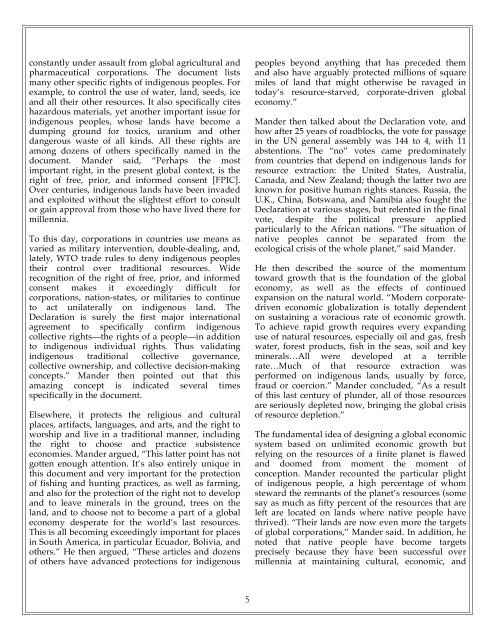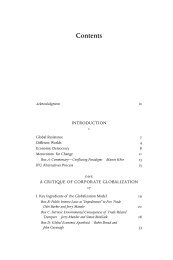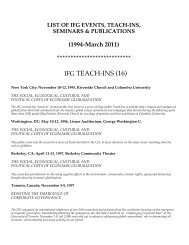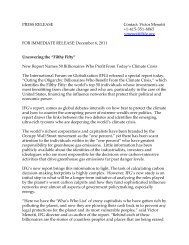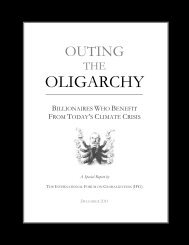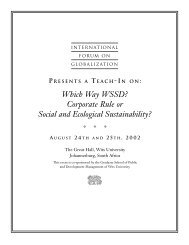UNDRIP Report - English FINAL - International Forum on Globalization
UNDRIP Report - English FINAL - International Forum on Globalization
UNDRIP Report - English FINAL - International Forum on Globalization
You also want an ePaper? Increase the reach of your titles
YUMPU automatically turns print PDFs into web optimized ePapers that Google loves.
c<strong>on</strong>stantly under assault from global agricultural and<br />
pharmaceutical corporati<strong>on</strong>s. The document lists<br />
many other specific rights of indigenous peoples. For<br />
example, to c<strong>on</strong>trol the use of water, land, seeds, ice<br />
and all their other resources. It also specifically cites<br />
hazardous materials, yet another important issue for<br />
indigenous peoples, whose lands have become a<br />
dumping ground for toxics, uranium and other<br />
dangerous waste of all kinds. All these rights are<br />
am<strong>on</strong>g dozens of others specifically named in the<br />
document. Mander said, “Perhaps the most<br />
important right, in the present global c<strong>on</strong>text, is the<br />
right of free, prior, and informed c<strong>on</strong>sent [FPIC].<br />
Over centuries, indigenous lands have been invaded<br />
and exploited without the slightest effort to c<strong>on</strong>sult<br />
or gain approval from those who have lived there for<br />
millennia.<br />
To this day, corporati<strong>on</strong>s in countries use means as<br />
varied as military interventi<strong>on</strong>, double-dealing, and,<br />
lately, WTO trade rules to deny indigenous peoples<br />
their c<strong>on</strong>trol over traditi<strong>on</strong>al resources. Wide<br />
recogniti<strong>on</strong> of the right of free, prior, and informed<br />
c<strong>on</strong>sent makes it exceedingly difficult for<br />
corporati<strong>on</strong>s, nati<strong>on</strong>-states, or militaries to c<strong>on</strong>tinue<br />
to act unilaterally <strong>on</strong> indigenous land. The<br />
Declarati<strong>on</strong> is surely the first major internati<strong>on</strong>al<br />
agreement to specifically c<strong>on</strong>firm indigenous<br />
collective rights—the rights of a people—in additi<strong>on</strong><br />
to indigenous individual rights. Thus validating<br />
indigenous traditi<strong>on</strong>al collective governance,<br />
collective ownership, and collective decisi<strong>on</strong>-making<br />
c<strong>on</strong>cepts.” Mander then pointed out that this<br />
amazing c<strong>on</strong>cept is indicated several times<br />
specifically in the document.<br />
Elsewhere, it protects the religious and cultural<br />
places, artifacts, languages, and arts, and the right to<br />
worship and live in a traditi<strong>on</strong>al manner, including<br />
the right to choose and practice subsistence<br />
ec<strong>on</strong>omies. Mander argued, “This latter point has not<br />
gotten enough attenti<strong>on</strong>. It’s also entirely unique in<br />
this document and very important for the protecti<strong>on</strong><br />
of fishing and hunting practices, as well as farming,<br />
and also for the protecti<strong>on</strong> of the right not to develop<br />
and to leave minerals in the ground, trees <strong>on</strong> the<br />
land, and to choose not to become a part of a global<br />
ec<strong>on</strong>omy desperate for the world’s last resources.<br />
This is all becoming exceedingly important for places<br />
in South America, in particular Ecuador, Bolivia, and<br />
others.” He then argued, “These articles and dozens<br />
of others have advanced protecti<strong>on</strong>s for indigenous<br />
peoples bey<strong>on</strong>d anything that has preceded them<br />
and also have arguably protected milli<strong>on</strong>s of square<br />
miles of land that might otherwise be ravaged in<br />
today’s resource-starved, corporate-driven global<br />
ec<strong>on</strong>omy.”<br />
Mander then talked about the Declarati<strong>on</strong> vote, and<br />
how after 25 years of roadblocks, the vote for passage<br />
in the UN general assembly was 144 to 4, with 11<br />
abstenti<strong>on</strong>s. The “no” votes came predominately<br />
from countries that depend <strong>on</strong> indigenous lands for<br />
resource extracti<strong>on</strong>: the United States, Australia,<br />
Canada, and New Zealand; though the latter two are<br />
known for positive human rights stances. Russia, the<br />
U.K., China, Botswana, and Namibia also fought the<br />
Declarati<strong>on</strong> at various stages, but relented in the final<br />
vote, despite the political pressure applied<br />
particularly to the African nati<strong>on</strong>s. “The situati<strong>on</strong> of<br />
native peoples cannot be separated from the<br />
ecological crisis of the whole planet,” said Mander.<br />
He then described the source of the momentum<br />
toward growth that is the foundati<strong>on</strong> of the global<br />
ec<strong>on</strong>omy, as well as the effects of c<strong>on</strong>tinued<br />
expansi<strong>on</strong> <strong>on</strong> the natural world. “Modern corporatedriven<br />
ec<strong>on</strong>omic globalizati<strong>on</strong> is totally dependent<br />
<strong>on</strong> sustaining a voracious rate of ec<strong>on</strong>omic growth.<br />
To achieve rapid growth requires every expanding<br />
use of natural resources, especially oil and gas, fresh<br />
water, forest products, fish in the seas, soil and key<br />
minerals…All were developed at a terrible<br />
rate…Much of that resource extracti<strong>on</strong> was<br />
performed <strong>on</strong> indigenous lands, usually by force,<br />
fraud or coerci<strong>on</strong>.” Mander c<strong>on</strong>cluded, “As a result<br />
of this last century of plunder, all of those resources<br />
are seriously depleted now, bringing the global crisis<br />
of resource depleti<strong>on</strong>.”<br />
The fundamental idea of designing a global ec<strong>on</strong>omic<br />
system based <strong>on</strong> unlimited ec<strong>on</strong>omic growth but<br />
relying <strong>on</strong> the resources of a finite planet is flawed<br />
and doomed from moment the moment of<br />
c<strong>on</strong>cepti<strong>on</strong>. Mander recounted the particular plight<br />
of indigenous people, a high percentage of whom<br />
steward the remnants of the planet’s resources (some<br />
say as much as fifty percent of the resources that are<br />
left are located <strong>on</strong> lands where native people have<br />
thrived). “Their lands are now even more the targets<br />
of global corporati<strong>on</strong>s,” Mander said. In additi<strong>on</strong>, he<br />
noted that native people have become targets<br />
precisely because they have been successful over<br />
millennia at maintaining cultural, ec<strong>on</strong>omic, and<br />
5


